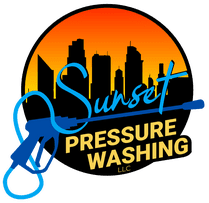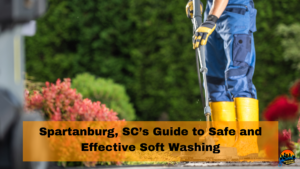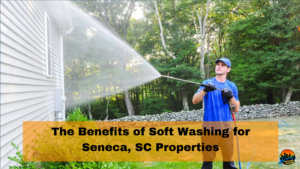
Soft Washing: The Gentle Solution for Charleston, SC Homes
Maintaining a clean and welcoming environment is essential for any church, especially when preparing for special events. In Charleston, SC, where history and community play a significant role in daily life, ensuring that church facilities are immaculate not only respects the sanctity of the space but also reflects the community’s values. This comprehensive guide covers various aspects of church cleaning services in Charleston, SC, detailing how to effectively prepare for events.
Understanding the Importance of Church Cleaning
Churches serve as spiritual havens and community centers, making their maintenance and cleanliness crucial. Here’s a deeper look at why this is so important, broken down into detailed aspects:
Respect for the Sacred
Churches are revered spaces, and cleanliness reflects the respect and reverence these environments command. A well-maintained church invites a sense of peace and sanctity, enhancing the spiritual experience for all attendees.
Health and Safety
Regular cleaning ensures that the environment is safe and healthy for congregants. This is particularly important in spaces where large groups gather, as it helps prevent the spread of germs and diseases, especially crucial in the post-pandemic world.
First Impressions Count
For many visitors, the church’s cleanliness will be their first impression. A clean and welcoming environment can be a deciding factor for newcomers considering joining the congregation or returning for future services and events.
Community Pride
A clean church fosters pride within the community. It shows that the congregation values its place of worship and is committed to its upkeep, encouraging a stronger community bond and increased volunteerism.
Enhancing Focus
A cluttered and dirty environment can be distracting and detract from the worship experience. Clean spaces allow congregants to focus better on the services and spiritual teachings without external distractions.
Longevity of Church Property
Regular cleaning and maintenance can significantly extend the life of church properties. This includes flooring, seating, and sacred items, which can degrade faster without proper care.
Preparation for Events
Events often bring in visitors who might not attend regular services. Preparing with thorough cleaning ensures that the church presents itself well and is ready for any type of gathering, from weddings to community meetings.
Pre-Event Cleaning Checklist
Preparing a church for an event involves meticulous attention to cleanliness and order to ensure the space is welcoming and conducive to worship and gathering. Below is a comprehensive checklist to guide the cleaning process for different areas of the church:
Sanctuary and Worship Areas
- Pews and Chairs: Wipe down all seating areas, removing dust and stains.
- Altars and Pulpits: Clean and polish all visible surfaces.
- Floors: Vacuum carpets and mop hard floors, paying special attention to walkways and high-traffic areas.
- Hymnals and Books: Dust and organize book racks.
- Sound Equipment: Dust off microphones, speakers, and mixing boards.
Entryways and Common Areas
- Doors and Windows: Clean glass surfaces to remove fingerprints and smudges.
- Welcome Mats: Shake out or replace to ensure a clean appearance.
- Bulletin Boards and Signage: Update and tidy up any displayed information.
- Furniture: Dust and wipe down benches and any other furniture.
Restrooms
- Toilets and Urinals: Disinfect and clean thoroughly.
- Sinks and Countertops: Sanitize and ensure there are no water spots.
- Mirrors: Clean for a streak-free finish.
- Soap Dispensers and Towel Racks: Refill and clean.
- Floors: Sweep and mop with disinfectant.
Kitchen and Social Halls
- Appliances: Clean and sanitize all surfaces, both interior and exterior.
- Countertops and Cabinets: Wipe down and organize contents.
- Tables and Chairs: Clean and arrange neatly for the event.
- Garbage Bins: Empty all bins and clean the insides to prevent odors.
Exterior and Access Points
- Walkways and Entrances: Sweep and clear any debris or leaves.
- Parking Lot: Check for cleanliness and organize any necessary signage.
- Gardens and Lawns: Trim any overgrowth and tidy up flower beds.
Lighting and Electrical Fixtures
- Light Fixtures: Dust and replace any burnt-out bulbs.
- Switches and Outlets: Wipe down to remove dirt and smudges.
Scheduling and Planning
Effective scheduling and planning are crucial for ensuring that church cleaning tasks are completed thoroughly and on time, particularly when preparing for an event. This section will outline how to efficiently organize and time these tasks to maintain a pristine environment for all church activities.
Assessing the Event Schedule
Start by understanding the nature and timing of the upcoming event. Whether it’s a regular service, a wedding, or a large community gathering, each type of event may have different cleaning requirements and setups. Align your cleaning schedule with the event’s timeline, ensuring that all cleaning activities are completed well before the commencement to avoid any last-minute rush.
Creating a Cleaning Timeline
- Advance Planning: Ideally, major cleaning efforts should begin at least a week in advance for large events. This allows for deep cleaning tasks without the pressure of imminent deadlines.
- Daily Tasks Leading Up to the Event: Assign daily tasks as the event approaches. This includes tasks like sweeping, mopping, and dusting that need to be maintained up to the day of the event.
- Final Touch-Up: Schedule a final cleaning session the day before or the morning of the event to address any last-minute details or areas that need refreshing, ensuring that everything is in perfect order.
Delegating Responsibilities
Assign specific tasks to individuals or teams. This delegation can include volunteers from the congregation, staff members, or professional cleaners, depending on the task and required expertise. Ensure everyone knows their responsibilities and deadlines to prevent any overlap or neglected areas.
Using Cleaning Checklists
Utilize detailed checklists (as outlined in the previous section) to ensure nothing is overlooked. Checklists can be divided by area (e.g., sanctuary, restrooms, exterior) and by frequency (e.g., daily, immediately before the event).
Monitoring Progress
Keep track of the cleaning progress through regular updates or meetings with the cleaning team. This ensures that all tasks are being performed as planned and allows for adjustments if certain areas need more attention.
Communication
Maintain clear and constant communication with all parties involved in the event, from church leadership to event planners, to ensure that cleaning schedules do not interfere with other preparations or activities.
Choosing the Right Cleaning Service
When preparing for an event at your church, selecting the right cleaning service is crucial to ensure that the venue meets the highest standards of cleanliness and presentation. Here are key considerations to help you choose the most suitable cleaning service for your church’s needs.
Understanding Services Offered
- Scope of Services: Ensure the cleaning company offers all the services you need. This might include deep cleaning, window cleaning, carpet cleaning, and restroom sanitization. Confirm that they can handle both interior and exterior cleaning if needed.
- Customization: The best cleaning services offer customizable plans that can be tailored to your specific requirements and the unique aspects of your church’s architecture and usage patterns.
Evaluating Cleaning Products and Equipment
- Eco-Friendly Options: For churches, using eco-friendly and non-toxic cleaning products is often important to protect older fixtures and finishes and ensure the health of the congregation, especially children and the elderly.
- Equipment: Verify that the cleaning service uses professional-grade equipment, which can provide more thorough cleaning and be more efficient.
Checking Compliance and Staff Training
- Insurance and Bonding: Ensure the cleaning service is fully insured and bonded to protect your church against any potential damage or liability issues.
- Staff Training: Inquire about the training procedures for staff. Well-trained personnel are more likely to perform their jobs effectively and handle any delicate areas of your church with the required care.
Cost and Contract Flexibility
- Transparent Pricing: Request detailed quotes from multiple services to compare prices and understand what is included in the fee. Avoid services that have hidden fees or that do not provide clear cost breakdowns.
- Contract Flexibility: Consider the terms of the service contract. Some companies offer flexibility such as no long-term commitments, which might be beneficial if your cleaning needs vary throughout the year.
Green Cleaning Practices
As environmental stewardship becomes increasingly important, many churches are opting for green cleaning practices to maintain their facilities. These practices not only ensure the cleanliness of the church but also safeguard the health of the congregation and the planet. Here’s how to implement eco-friendly cleaning methods effectively:
Choosing Eco-Friendly Products
- Biodegradable Cleaners: Opt for cleaning agents that are biodegradable and made from natural ingredients. These products break down more easily in the environment and are less likely to cause harm to soil and water.
- Non-Toxic Chemicals: Use cleaners that are free from harsh chemicals like chlorine and ammonia. Non-toxic products ensure that the indoor air quality of your church remains safe for all attendees, particularly children, the elderly, and those with respiratory issues.
- Certified Products: Look for products that have been certified by reputable environmental organizations. These certifications ensure that the products meet stringent environmental and health standards.
Implementing Sustainable Cleaning Techniques
- Microfiber Cloths: Use microfiber cloths instead of paper towels for cleaning. Microfiber is not only more effective at trapping dirt and dust but also reusable, reducing waste.
- HEPA Filters in Vacuums: Ensure that vacuums are equipped with HEPA filters, which capture fine particles like pollen and dander more effectively than regular filters, improving air quality.
- Conservative Water Usage: Adopt cleaning methods that minimize water waste, such as using bucketless mopping systems or controlling the flow rate of water during cleaning.
Training and Awareness
- Educate Cleaning Staff: Training for cleaning staff on green cleaning practices is essential. They should understand how to use eco-friendly products properly and why these practices are beneficial.
- Inform the Congregation: Share your church’s commitment to green cleaning practices with the congregation. This transparency can encourage community support and participation in maintaining these standards.
Waste Management and Recycling
- Proper Disposal: Set up systems for properly disposing of cleaning waste. This includes separating recyclables and ensuring hazardous waste is handled according to local regulations.
- Reusable Supplies: Invest in reusable supplies where possible. For example, refillable soap dispensers reduce plastic waste compared to single-use containers.
Special Considerations for Historical Churches
Historical churches hold significant cultural and architectural value, making their upkeep a matter of special consideration. When cleaning these revered spaces, particularly in preparation for events, it’s crucial to balance thoroughness with the need to preserve delicate materials and structures. Here are key guidelines to follow:
Understanding Historical Significance
- Research and Documentation: Before implementing any cleaning procedures, it’s important to understand the architectural history and any specific preservation needs of the building. Documentation about past renovations and the materials used can guide appropriate cleaning methods.
- Consultation with Experts: Engaging historians or preservation experts can provide insights into the best practices for maintaining historical integrity while cleaning. These professionals can offer advice tailored to your church’s specific needs and materials.
Choosing Appropriate Cleaning Methods
- Gentle Cleaning Solutions: Use mild, pH-neutral cleaning agents specifically designed for historic materials. Harsh chemicals can damage older stone, wood, and metal, which may have weakened over time.
- Soft Techniques for Delicate Surfaces: Employ soft brushes, cloths, and gentle, non-abrasive techniques to clean intricate woodwork, stained glass, and ornamental metalwork. This prevents scratches and other damage to surfaces that are often irreplaceable.
Preserving Interior Elements
- Regular Dusting and Vacuuming: Frequent, gentle cleaning is preferable to less frequent, more intensive cleaning. This approach helps avoid the buildup of dirt and grime that can require harsher methods to remove later.
- Climate Control: Maintain a stable indoor environment with controlled humidity and temperature to protect organic materials like wood from warping, cracking, or molding.
Addressing Exterior Challenges
- Sensitive Materials: Exterior elements such as masonry, roofing, and windows require special attention. Techniques like low-pressure washing can clean effectively without the damage caused by high-pressure methods.
- Landscaping Considerations: Ensure that landscaping does not pose a risk to the structural integrity of the building. Keep trees and bushes trimmed back to prevent moisture accumulation and physical damage.
Compliance with Regulations
- Heritage Preservation Laws: Adhere to local and national regulations concerning historic buildings. These laws can dictate what can and cannot be done in terms of cleaning and maintenance.
- Permits and Approvals: In some cases, cleaning and maintenance activities, especially those that affect the structure or appearance of the building, may require permits. Ensure all necessary permissions are in place before beginning work.
Training and Specialized Services
- Specialized Cleaning Crews: Consider hiring cleaning services that specialize in historic buildings. These professionals are trained to handle the unique challenges posed by historical structures.
- Ongoing Education: Keep your maintenance team informed about the latest preservation techniques and products. Regular training sessions can be beneficial.
Engaging the Community in Upkeep
Involving the community in the upkeep of a church not only helps maintain the space but also fosters a sense of ownership and pride among congregants. Here are strategies to effectively engage the community in maintaining and preparing the church for events:
Organizing Volunteer Days
- Scheduled Clean-up Events: Plan regular volunteer days where members of the congregation can come together to clean and maintain the church. These can be scheduled before major events or on a regular basis, like quarterly or bi-monthly.
- Roles for Everyone: Create a range of tasks suitable for different age groups and abilities. This ensures that everyone can participate, from children to the elderly. Tasks can range from simple dusting and organizing to more involved jobs like landscaping or painting.
Providing Necessary Tools and Training
- Supplies and Equipment: Ensure that volunteers have access to all necessary cleaning supplies and equipment. This might include gloves, brooms, mops, and safe cleaning products.
- Instruction and Supervision: Provide clear instructions and supervision, especially for tasks that may require a certain technique or care. This ensures the safety of volunteers and the proper care of the church facilities.
Making It a Social Event
- Foster Community Spirit: Combine cleaning efforts with social activities. For example, conclude a clean-up day with a potluck meal or a small celebration. This makes volunteering more enjoyable and rewarding, and it encourages greater participation.
- Recognition and Appreciation: Acknowledge the efforts of volunteers. This can be through simple thank-yous, recognition in church bulletins, or small rewards like certificates. Appreciation goes a long way in building a loyal volunteer base.
Leveraging Skills and Talents
- Skill-Based Volunteering: Identify and utilize the specific skills of congregation members. For instance, someone with a background in horticulture might lead a project on church gardens, while someone who is handy might focus on repairs.
- Training Workshops: Organize workshops where skilled volunteers can teach others new skills, such as proper cleaning techniques, minor repairs, or even crafting for church decorations.
Building Long-Term Engagement
- Regular Communication: Keep the community informed about upcoming volunteer opportunities and the specific needs of the church through newsletters, social media, and announcements.
- Feedback and Improvement: Solicit feedback from volunteers about their experiences. This not only helps improve future initiatives but also makes volunteers feel heard and valued.
Post-Event Cleaning Strategies
After hosting an event, efficient and thorough cleaning is crucial to restore the church to its regular state of cleanliness and readiness for regular activities. Here are effective strategies to ensure post-event cleaning is handled efficiently:
Immediate Assessment
- Quick Walk-through: Conduct a quick walk-through immediately after the event to assess the areas that need urgent cleaning. This helps prioritize tasks and allocate resources effectively.
- Damage Inspection: Check for any spills, stains, or damage that might have occurred during the event. Addressing these issues immediately can prevent permanent damage and reduce cleaning difficulties later.
Organizing the Cleaning Crew
- Divide and Conquer: Assign specific areas and tasks to different teams or individuals. For instance, one group can handle the sanctuary while another takes care of the fellowship hall. This division of labor makes the process more manageable and efficient.
- Utilize Checklists: Employ detailed checklists for each area to ensure no tasks are overlooked. These lists can include clearing debris, vacuuming carpets, wiping surfaces, and sanitizing restrooms.
Focusing on High-Traffic Areas
- Prioritize Commonly Used Spaces: Areas like entryways, restrooms, and dining areas typically see more use and may require more intensive cleaning post-event. Pay special attention to these areas to ensure they are thoroughly cleaned and sanitized.
- Refreshments and Waste Disposal: Clear away all garbage, especially in areas where food was served. Check for and remove any leftover plates, cups, or food items. Sanitize surfaces where food was prepared or consumed.
Deep Cleaning vs. Surface Cleaning
- Surface Cleaning: Perform general surface cleaning immediately after the event. This includes wiping down surfaces, sweeping floors, and arranging furniture.
- Scheduled Deep Cleaning: Plan for a deeper clean in the following days if needed. This may involve carpet cleaning, floor polishing, and extensive sanitizing of kitchens and restrooms.
Restocking and Replenishing Supplies
- Inventory Check: After the event, take inventory of cleaning and bathroom supplies. Restock items like hand soap, paper towels, and toilet paper to ensure the church is prepared for the next services or events.
- Review Cleaning Supplies: Replenish cleaning supplies used during the event to keep your inventory ready for regular maintenance or unexpected needs.
Evaluation and Feedback
- Post-Cleaning Review: After the cleaning is complete, conduct a review to evaluate the efficiency of the cleaning process. Identify what went well and what could be improved for future events.
- Gather Feedback: If volunteers or a professional cleaning service were involved, gather feedback on their experiences. This can provide valuable insights into the effectiveness of your strategies and areas for improvement.
Experience the Gentle Power of Soft Washing for Charleston Homes
Soft washing is a superior, low-pressure cleaning solution that’s perfect for Charleston, SC homes, offering a safer alternative to high-pressure washing for delicate surfaces like roofs and siding. At Sunset Pressure Washing, we specialize in this gentle yet effective method, using specialized solutions to not only clean but also preserve your home’s exterior. Our skilled team ensures your property receives a meticulous clean that boosts curb appeal while protecting it. Discover the benefits of soft washing by visiting our website and scheduling a consultation with Sunset Pressure Washing today, where we prioritize the care and beauty of your home.






